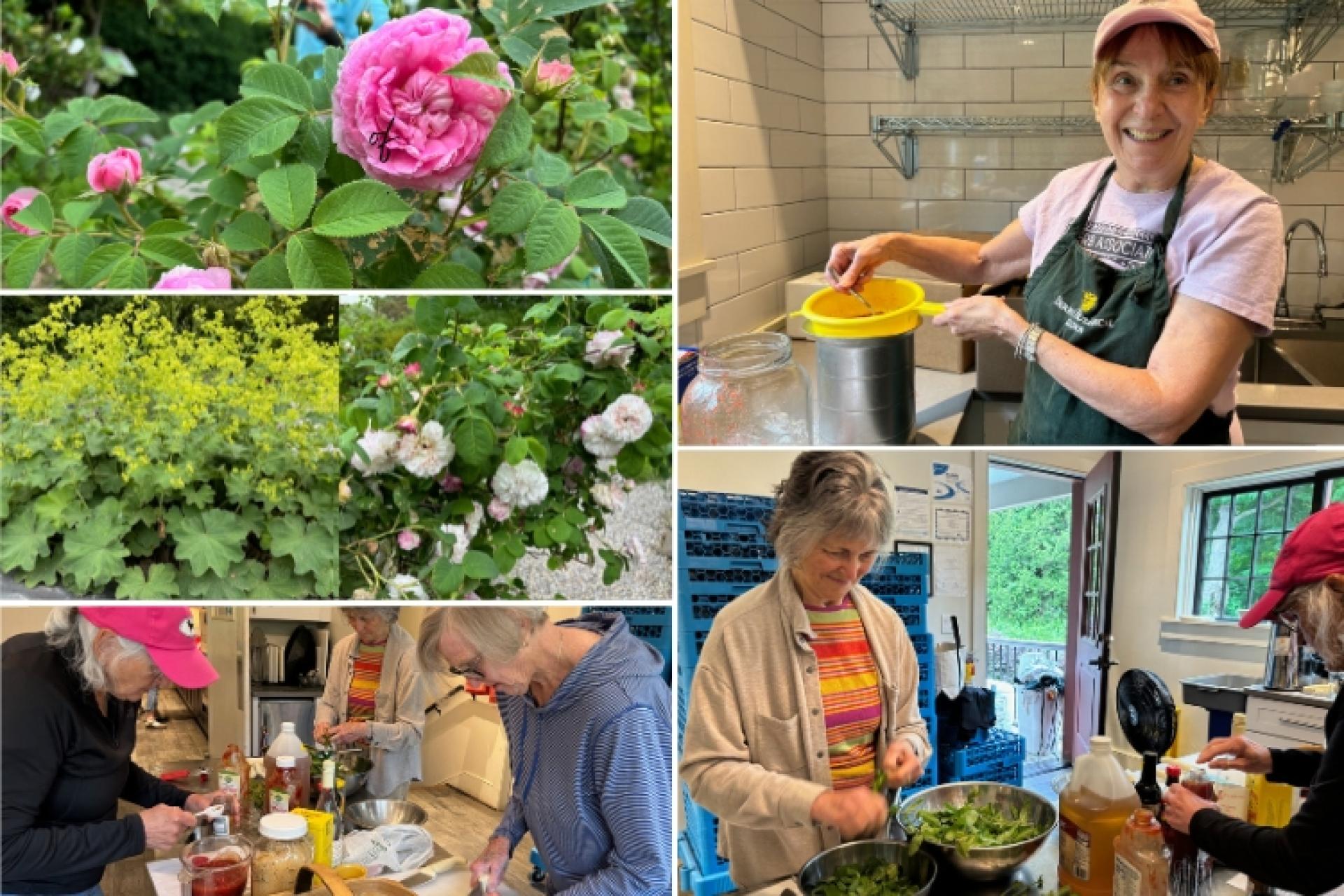You are here
What Is Happening in the BBG Herb Gardens and Kitchen This Week (June 11)
What Is Happening in the BBG Herb Gardens and Kitchen This Week (June 11)
By Barbara F. Smith
Roses, Roses, Roses — surely this growing season has produced extraordinary blooms of many kinds, including those found in the BBG Herb Display Garden near the Center House. Several varieties pictured above, not surprisingly, are found in the fragrance bed: the dark pink “Apothecary Rose” (Rosa Gallica var. officinalis), “Frau Dagmar Hastrup” (an antique Rugosa rose with a mid-pink flower which blooms repeatedly ), “Leda” (also known as Painted Damask featuring double blooms of milk-white petals edged irregularly in crimson) and “Rose de Rescht” (old rose), a loosely cascading shrub of fuchsia pink that blooms in late spring then reliably has repeat blooms; it is relatively shade tolerant. Not surprisingly, each of these roses has an exquisite fragrance.
Today, gardeners might not think of roses as herbs, but recall that what defines a herb may be determined by whether it has a use (beyond beauty), for example, in food, medicine, fragrance, or cosmetics. The roses mentioned above are appreciated for their highly fragrant, oil-rich petals. In ancient times, roses were recommended for internal use to ease melancholy, cool fevers or settle stomachs. As a topical treatment, rosewater was said to cure headaches and insomnia. In Renaissance times, a snuff containing rose powder and sage was said to ease anger and promote happiness. More recently, herbalists focus less on healing power and more on usefulness of rose petals in potpourri or cooking. Likewise, rose hips are rich in vitamins and have been used in jams.
Also pictured above is Lady’s Mantle (Alchemilla mollis — a perennial herb discussed in another recent article), which has since bloomed its glorious chartreuse cloud of small flowers above its decorative foliage, surely a useful addition to seasonal bouquets.
Turning to the medicinal bed in the Display Garden, the perennial herb Arnica (Arnica montana) is putting on its display of yellow daisy-like blossoms on stems of 12-24 inches. Centuries ago, this plant was reputed to have healing benefits for bruising or muscle injuries. This variety is native to Europe, but a related species found in western United States was valued by Native Americans for similar purposes. Arnica has been shown to have anti-inflammatory properties, effective in liniments and salves to relieve muscle aches and pains. However, it can be toxic if ingested or used undiluted on skin.
WHAT’S HAPPENING IN THE HERB KITCHEN?
The Herb Associates Kitchen Crew were at full strength and eager to use the fresh bounty of herbs available. The aromas arising from the preparation of mint jelly and mint sauce and from “Ford’s Garlic Scape Jelly” brought several visitors into the Center House kitchen, eager to learn what smelled so good! Lemon balm leaves and mint leaves were set to dry. And a batch of BBG Barbecue Sauce, the final preparation of the Strawberry Shrub and the beginnings of a Raspberry Shrub rounded out the makings today. Interested in trying something new? Shrubs are prepared basically with fruit, sugar and vinegar, which together make a tasty and tangy addition to lemonade, club soda or your favorite cocktail.
Stop by the Gift Shop found in the Visitor Center to check out all the offerings made by the Herb Associates. Proceeds support the work of the Garden. Thank you for your ongoing interest in all things herbal at the Berkshire Botanical Garden!
The Berkshire Botanical Garden’s Herb Associates began in 1957 and have been making and selling products for the benefit of BBG ever since. At BBG, the Herb Associates oversee a display garden and production garden, both located near the Center House. Members/volunteers meet every Tuesday morning during the late spring through mid-autumn each year, coinciding when the gardens themselves are open to the public. Members plant, weed and tend the gardens, as well as harvest and process the variety of herbs.
Help Our Garden Grow!
Your donation helps us to educate and inspire visitors of all ages on the art and science of gardening and the preservation of our environment.
All Donations are 100 percent tax deductible.



